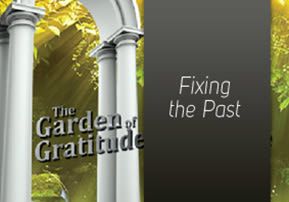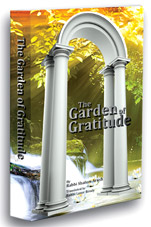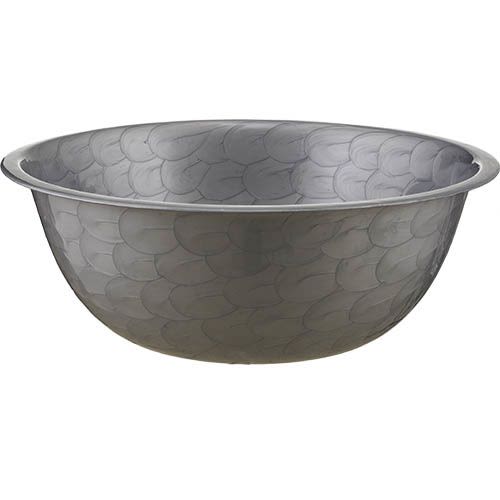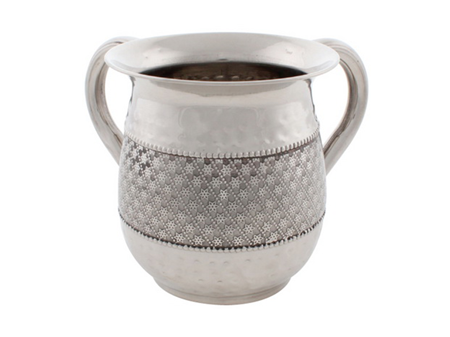
Fixing the Past
The “Garden of Gratitude” says: “In the future, we will realise how all the seemingly bad things were actually acts of profound loving-kindness...”

There are so many good things in the ‘Garden of Gratitude’, the latest book by Rav Arush, that it’s hard to discuss it. Literally, every page or  two, you get another bit of ‘blow you away’ Torah that’s completely life-changing.
two, you get another bit of ‘blow you away’ Torah that’s completely life-changing.
The stuff about ‘tiny tribulations’ was completely life-changing (and you can get the gist by watching Rav Brody’s Tiny Tribulations VOD shiur). The stuff about complaining only bringing more difficulties down on a person was completely life-changing (pick up the CD ‘Stop Crying’ and you’ll see what I mean.)
I could go on and on and on.
But my latest revelation has to do with fixing the past. By the time we get into our thirties (and sometimes, even earlier…) we all have a long list of emotional baggage weighing us down and skewing how we see ourselves, and other people, and our lives.
Some bits of baggage are called ‘a tough childhood’. Other bits are called ‘failed relationships’ or ‘failed aspirations’. Still others are called ‘serious traumas’. And the heaviest bits of all are called ‘our own mistakes’.
What they all have in common is that they are things that happened to us, or that we experienced, and that we felt were ‘bad’ things. If you are like most people, you try and forget all about these ‘negative’ experiences as quickly as possible, and start a fresh page.
But the problem is, even if we don’t want to acknowledge and deal with our baggage, we still find ourselves tripping over it, all over the place. We still find ourselves ‘reacting’ to things from 20 years’ ago; or over-reacting because of things in our past.
I’ve tried a lot of things to ‘overcome’ what I saw as a whole bunch of emotional ‘handicaps’ from my formative years; I’ve gone to big ‘self-help’ meetings involving hundreds of people; I’ve done years of parenting courses; I’ve tried Neuro Linguistic Programming, ‘visualisation’, and of course, I went through three shrinks trying to find one that could actually help me (in less than 50 years…)
The only thing that helped was talking to G-d. But until I read Garden of Gratitude, I wouldn’t say I’d actually ‘fixed’ the past. I’d accepted it, I’d got over it, I’d forgiven a bunch of people, I’d moved on. But it would be going too far to say it was actually ‘fixed’.
And then, I read the most amazing ideas. On page 213 of the English copy of Garden of Gratitude, it says: “In the future, we will realise how all the seemingly bad things were actually acts of profound loving-kindness.”
On page 214, it says: “When a person reviews his life and thanks G-d for things he had not been previously grateful for, he rectifies his entire life.”
And on page 215, it continues: “The negative circumstances of our lives were the will of G-d, and for our ultimate good.”
I suddenly realised that I’d been given a bona fide short-cut for fixing the past, and finally getting rid of all my useless, damaging emotional baggage: accept that it was all from Hashem, and all for my good.
Wow.
I thought about it, and I realised that it really is that simple, at least for a person with emuna. It all comes down to the three main principles of emuna, namely: Everything comes from G-d; G-d’s doing it all for the best; G-d is trying to tell me something.
OK, when life was very hard growing up, there was no Garden of Emuna or Emuna CDs or internet lectures to help me get the right perspective.
But now? Now there is.
Now, I could fix the past, simply by applying the three main principles of emuna to everything that happened.
That realisation alone helped tremendously.
But as Rav Arush teaches time and time again, if we want to really internalize these teachings, and to really change things in a profound way, we have to pray about it.
I’ve had the privilege of giving out tons of emuna CDs, and tons of emuna books. I’ve had the privilege of teaching a couple of classes on emuna stuff; and I often wonder to myself: ‘why are all the life-changing ideas being heard, read and discussed not really penetrating? How can people hear this stuff, and remain unmoved or unchanged by it?’
Recently, I heard a lecture by Rav Arush which explained it all. He said that if a person is not doing an hour of hitbodedut every day, his lessons can help a bit, here or there, but they can’t really change things from the inside out.
Only prayer can do that. Only daily teshuva can do that. Only a strong connection to G-d can do that.
People often complain that it’s so hard to do hitbodedut, to find the time, to have what to say. At the beginning, it really, really is. But that’s because it’s the route for fixing the past.
It’s the route for letting go of all the destructive guilt; all the blame; all the bitterness, so of course, it’s not going to come for free.
As each month goes by, I’m tossing more and more emotional baggage away. If I forget to brush my kids’ teeth one night, I no longer have two weeks of feeling like a bad mother. If I say something stupid, I no longer replay the conversation over and over and over in my head. I say sorry to G-d, I say sorry to whoever I need to, and I move on.
Once you are free from all the emotional baggage, it’s so much easier to deal with the day-to-day issues and mistakes that we all have. Hooray, I’m not perfect! And I don’t have to pretend that I am anymore, particularly to myself!
Once the past is ‘fixed’, the present becomes such a calm, serene, happy place, and the future stops being full of lurking, monstrous ‘what ifs?’
It’s the biggest present you could possibly give yourself. And all it takes is a desire to make a start. You don’t have to do an hour at the beginning. Rebbe Nachman writes that ‘even a little is good’. Do five minutes a day, and very quickly, you’ll see how all those ‘broken’ things; all those ‘sour’ relationships, all those ‘heavy’ feelings somehow or other get fixed.
And if that isn’t worth a bit of time and effort, then I don’t know what is.












Tell us what you think!
Thank you for your comment!
It will be published after approval by the Editor.